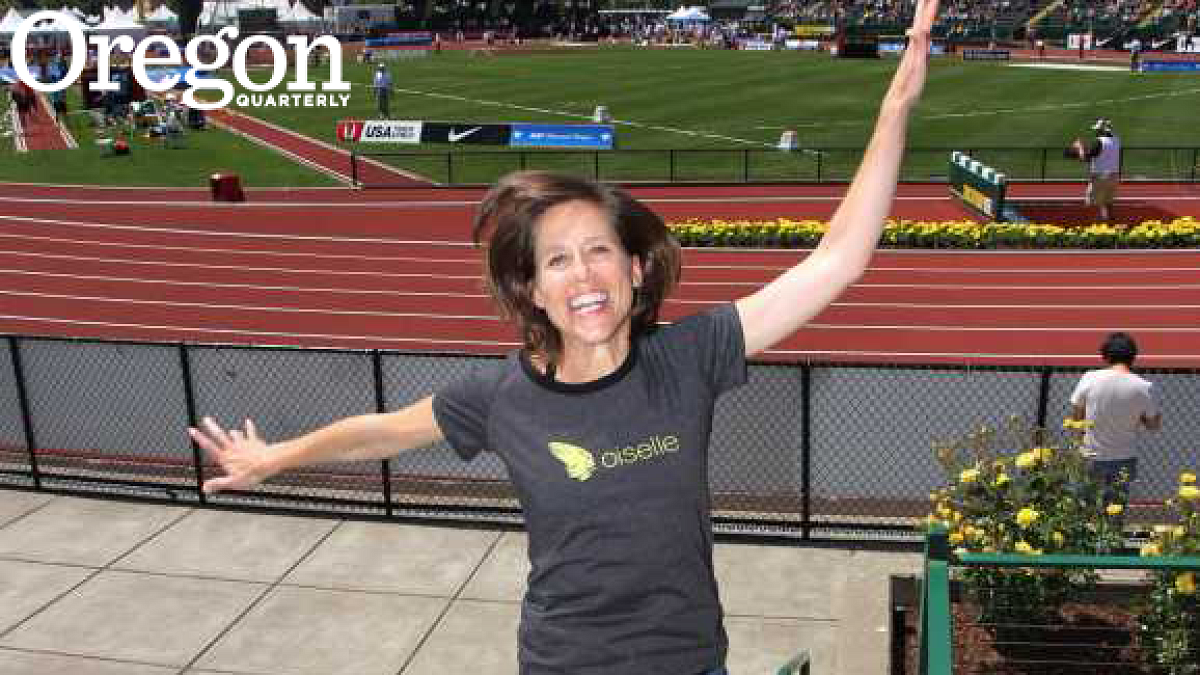Sally Bergesen '91 wasn't finding quite what she was after at outdoor emporium REI, vaguely athletic Athleta, or blissed-out Lululemon. All of these companies target women-on-the-run as much as women runners. They sell products for the active woman—not necessarily the competitive woman.
So Bergesen launched a women's running apparel company named Oiselle (a French word meaning "female bird"). She is building a company that promotes competition between women and aims for it to become the go-to brand for women runners who train and race at any level. And this bird tweets: Using social media to reach out to fans of women's running, Oiselle cheers elite racers, regardless of whether they're already running under another brand's banner. "We call it stalking," Bergesen says.
It's an approach that piqued the interest of Lauren Fleshman, the two-time USA Track and Field 5,000-meter champion who finished seventh in the 5,000-meter final at the 2011 International Association of Athletics Federations World Championships. On her blog, Ask Lauren Fleshman, the runner describes an online courtship with Oiselle that began when Bergesen followed her on Twitter, later developing into a "girl crush" and "brand crush." Fleshman and Oiselle's courtship heated up after the runner's nearly 10-year sponsorship deal with Nike expired. Fleshman warned Bergesen that she planned to have her first child in 2013 and would need a year off from the sport; Bergesen, a working mother herself, signed her to a deal anyway.
"If you're pregnant, you are 90 percent of the time going to lose your financial support" as an athlete, Fleshman says. "And the reality is, women athletes get pregnant. Sometimes, during a career that starts at 21 and ends at 38, they have babies."
Oiselle's support has been anything but half-hearted. Bergesen has done everything from selling "Lauren Fleshman is my homeboy" T-shirts to babysitting Fleshman's six-week-old son when she needed four hours to write her column for Runner's World. "That kind of attitude just makes you want to work that much harder for them, to win races and show the world that this company is about more than just speed," Fleshman says. "They support women."
Fleshman is one of 25 elite runners—haute volée, or high flyers—sponsored by Oiselle. The company pays a few of these runners, among them Fleshman and Kate Grace, who this year took fourth place in the 800-meter run at the USA Track and Field Championships. "We also invest in the training infrastructure that supports elite athletes, including subsidized housing, physical therapy, medical treatment, travel, and coaching," Bergesen says.
Oiselle supports another 225 athletes with products and discounts, and their promotion of both their athletes and the sport of running is loud and proud. To back Grace, the company produced a track groupie–spoofing video to Sir Mix-a-Lot's hip-hop soundtrack of "Posse on Broadway." "You don't see fan girls cheering on other women with rabid enthusiasm," Fleshman says. "That's something Oiselle has tried to encourage."
With revenues on track to reach $10 million in the next few years, Oiselle is still an upstart compared to industry giants Nike and Columbia Sportswear, and its marketing maneuvers are in keeping with its size, says T. Bettina Cornwell, the Edwin E. and June Woldt Cone Professor of Marketing at UO's Lundquist College of Business. Oiselle, she says, seems to be building relationships with athletes who actually wear the brand, and consumers crave that sort of authenticity. "It's more grassroots, at least right now," Cornwell says. "They seem to be very successful."
Cornwell says Oiselle is nurturing a "brand community." For example, Cornwell says, "they share information with each other through shared words or inside jokes, if you will. They have some rituals, even, that have something to do with the brand they share. I think Oiselle has done a great job. They have extensive endorsements from brand users."
Bergesen's definition of a competitive runner encompasses more than the world-class athletes who took up the sport when they were kids. She laced up her own running shoes later in life, after gaining 15 pounds studying abroad in France. "While it may be true that French women do not get fat, I can attest to the fact that white girls from California do," Bergesen writes on Oiselle's website.
The UO English major fell in love with the sport during night runs around the South Eugene hills wearing big boxer shorts and cotton shirts. "That's the beauty of running," Bergesen says. "The barrier to entry is pretty low."
Bergesen's racing days (she's run a 2:59 marathon) only began after a postcollege move to Seattle, around the same time her career in marketing took off. Before launching Oiselle, she worked in brand strategy at her consulting firm, Waywords, and for the Leonhardt Group, a design firm, on corporate accounts that included Microsoft, Starbucks, and
Nordstrom. Bergesen specialized in naming products, giving an emergency contraception method the now-famous moniker "Plan B."
Bergesen is putting those skills to use as she builds Oiselle. The growing company now has 12 employees—all women, many runners—and a 12-person sales staff. Oiselle grew 300 percent in its first year, and has seen 75- to 100-percent growth every year after. Retail chain Title Nine and some 250 running stores around the country carry the brand.
After launching with a single style of running shorts, Oiselle's line now features a full array of garments—even, yes, a romantic "runaway bridal" dress.
Running is "bigger than a sport," Bergesen says. "It's about a philosophy—showing up for life."
—By Paige Parker


